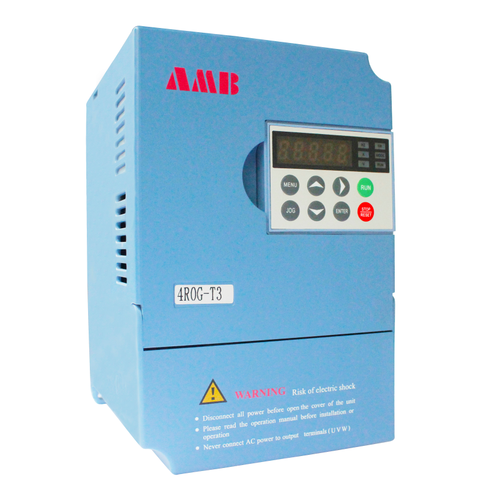
Low voltage fault
The VFD reports a low voltage fault when the DC link voltage of the drive drops below 62% of the nominal level at the high setting (480 VAC) and 50% of the nominal value of the low setting (400 VAC).
The + 10% and - 15% voltage tolerances in most manuals are recommended operating ranges to allow the driver on hand to maintain high efficiency and proper motor current. The drive can be below these tolerances, but the reduced voltage can have unpredictable effects on motor current, motor temperature and overall performance.
More specifically, if the line voltage parameter of the driver is set to high and 480 VAC is being applied, the driver will generate a low voltage fault when the DC link voltage drops to 62% of the nominal - e.g., 480 VAC · 0.62 · √ 2 = 421 VDC. The nominal DC link voltage is 480 VAC · √ 2 = 679 VDC.
Notes on switching
Although it is generally accepted to switch VFD from line supply to standby generator in many applications, there are some limitations. Most importantly, the phase to phase voltage input voltage swing of many portable standby generators is greater than the phase to phase voltage tolerance recommended by the driver, usually less than 2%. To prevent voltage oscillations, VFDs are equipped with surge protectors in the input rectifier circuits - but external protection (e.g. surge arresters) may be required for severe input disturbances. Large variance will produce large ripple on DC bus capacitance, which will cause capacitor and other power components to be damaged over time.
Another potential problem arises when switching from line power to standby generators. Most drivers take at least two minutes to power up again; failure to follow this guideline may damage the charging relay circuit, or at least damage the input fuse or trip the circuit breaker.
3% line reactor may improve the current surge caused by moderate input power voltage.
Another solution is to add a voltage monitor with an appropriate time delay. They have protection trip levels to shut down the drive in the event of under voltage, over voltage, loss of phase and phase to phase voltage imbalance. These devices ensure that the VFD is not exposed to unbalanced input power or power up until the voltage is within tolerance and the appropriate delay time is met.
Isolation transformer
The final recommendation - the most expensive solution - is to use isolation transformers. This ensures complete isolation of input power issues associated with grounding and noise that may affect the drive. Does isolation transformer provide better protection than line reactor? Yes. When does the application need isolation transformer? This type of transformer is recommended when installed close to the substation.
There are many advantages in inserting driver isolation transformer between VFD and its power supply. Isolation ensures that there is no direct electrical connection between the source and the load - but for any transformer other than an autotransformer. The unique feature of the drive isolation transformer is the grounding electrostatic (Faraday) shield placed between and around the primary and secondary windings. This shielding reduces the capacitance coupling involved in the transmission of common mode voltage interference by one million times. Without this shielding, the capacitor allows high frequency noise and transient voltage spikes to pass through the transformer.
Common mode transients are transients that occur between the ground and the neutral point of an AC system. Although the two parts of a circuit are usually combined at one point, they cannot be considered to have the same potential throughout the power system. The common mode transient interference results from the normal operation of switching power supply, driver operation, arc welding machine, lightning, and even stepping motor. Some isolation transformers also prevent "normal mode" transients between the line and neutral.
Consider an application in which the daily utility power supply of a substation capacitor bank in an industrial park causes a transient voltage spike - amplified by reflection of field capacitors in a nearby factory. Suppose a facility in the park has several small drives rated at 7.5 HP. Normal mode transients can cause these drives to shut themselves down, resulting in costly process downtime. This interruption can be prevented by isolating the transformer.

|
|

|
| The public, | Mobile station |
 0755-81719517
0755-81719517
|
|
 0755-81719530 0755-81719530 |
 amb@ambition.com.cn amb@ambition.com.cn |
 Floor 1, 5 and 6, building 7, lijincheng science and technology industrial park, gongye dong road, longhua new district, shenzhen Floor 1, 5 and 6, building 7, lijincheng science and technology industrial park, gongye dong road, longhua new district, shenzhen |
|